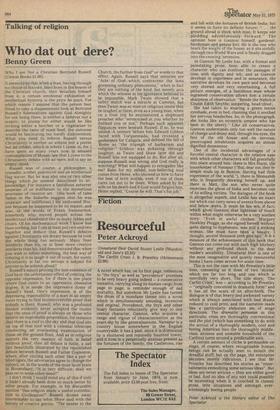Fiction
Resourceful
Peter Ackroyd
Unnatural Heir David Stuart Leslie (Macdonald and Jane's £3.25)
The Carfitt Crisis J. B. Priestley (Heinemann £2.90)
A novel which has, on its first page, references to "the Styx" as well as "providence" prom'ises to be very heavy going indeed — a consecutive narrative, carrying along its human cargo from page to page, is reminder enough of sad mortality. But somehow Mr Leslie has turned the dross of a mundane theme into a novel which is simultaneously amusing, inventive and original. Providence, the Styx and other hoary fantasies reluctantly give way to one central character, Gannon, who acquires a range and vigour of characterisation as the years slip by like generalisations. Nanapur is a country house somewhere in the English countryside; it has a past, since it is dominated by a shuttered and reputedly haunted tower, and it lives in a perpetually anxious present as the fortunes of the family, the Castletons, rise and fall with the fortunes of British India; but it seems to have no definite future: ". . . the ground ahead is thick with mist. It keeps one plodding adventurously forward." The optimist here is Gannon himself, gardener, handyman and genius loci. He is the one who bears the weight of the house, as it sits stolidly through two World Wars and is finally dragged into the crowing 'seventies.
In Gannon Mr Leslie has, with a formal and painstaking prose, been able to create a character who can confront the passages of time with dignity and wit; and as Gannon develops in experience and in assurance, the narrative develops its own pace and becomes very shrewd and very entertaining. A full picture emerges, of a fastidious man whose ingrained conservatism allows him a certain sharpness of observation: "Beside the Nabob is Cousin Edith Smythe, simpering, head tilted .. . She had taken to wearing a green tennis eyeshade, even in bed, claiming that it soothed her nervous headaches. So, in the photograph, she looks like an eccentric umpire who has been at the sherry." Like all conservatives, Gannon understands only too well the nature of change and decay and, through his eyes, the fate of the old house and its nervous, preoccupied inhabitants acquires an almost dignified demeanour.
One of the incidental advantages of a forceful central character is the relative ease with which other characters will fall gracefully into place around him: there is Mrs Hurst, the housekeeper of Nanapur ("But, dear me, they're simple souls up in Buxton. Having had little experience of the world."), there is Memsahib who is frequently , drawing herself up, and there is Matt, the son who never quite exorcises the ghost of India and becomes one of its willing victims. The dialogue of the book is altogether superb, and Leslie has an exact ear which can carry news of events from above and below stairs. It must be his wit, if fact, which gives Gannon that lightness of touch within what might otherwise be a very sombre story: "Even in awful clothes, Margery Hawkley Plugge, as she signed herself without quite daring to hyphenate, was still a striking woman. She must have been a beauty. I thought, several thousand pink gins ago." It is a measure of the achievement of this book that Gannon can come out with such high bitchery without any profound shock to the dear reader's sensibility. Unnatural Heir is one of the most imaginative and quietly resourceful books 1 have come across for some time.
This is not the case with Mr Priestley's little item, consisting as it does of two 'stories' which are far too long and one which is mercifully very short. The title story, 'The Carfitt Crisis', was — according to Mr Priestley — "originally conceived in dramatic form" and it has all the scars of an after-birth. The dialogue is of that heavy and awkward variety which is always associated with bad drama reduced to cold print, and the narrative reads like a particularly elaborate set of stage directions. The dramatis personae in this particular crisis are thoroughly conventional and the plot (which has something to do with the arrival of a thoroughly modern, cool and boring American into the thoroughly middleclass, anxious and unstable household of the Carfitts) turns around a predictable axis.
A certain amount of cliche is permissible on stage, of course, where recognisable human beings can be actually seen to mouth the dreadful stuff; but on the page, the enterprise becomes merely ridiculous. I see that Mr Priestley has described his stories as "entertainments embodying some serious ideas". But ideas are never serious — they are either good or bad. And no idea of any sort could possibly be interesting when it is couched in clumsy prose, trite situations and amongst overwhelmingly boring people.
Peter Achroyd is the literary editor of The Spectator


























 Previous page
Previous page